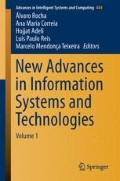Abstract
The purpose of this paper is to present a platform that uses social media as a data source to support the decisions of policymakers in the context of smart tourism destinations initiatives. The proposed platform was implemented and tested during the 2014 FIFA World Cup. In total were analyzed 7.5 million tweets. The results show that it is possible to identify the nationality, language of the posts, points of agglomeration and concentration of visitors. Overall the initial results suggest that data collected from Twitter posts can be applicable to the effective management of smart tourism destinations.
Access this chapter
Tax calculation will be finalised at checkout
Purchases are for personal use only
Preview
Unable to display preview. Download preview PDF.
References
Anantharam, Pramod, et al. “Extracting City Traffic Events from Social Streams.” ACM Transactions on Intelligent Systems and Technology 9.4 (2014).
Boes, Kim, Dimitrios Buhalis, and Alessandro Inversini. “Conceptualising Smart Tourism Destination Dimensions.” Information and Communication Technologies in Tourism 2015. Springer International Publishing, 2015. 391-403.
Buhalis, Dimitrios, and Aditya Amaranggana. “Smart tourism destinations.” Information and Communication Technologies in Tourism 2014. Springer International Publishing, 2013. 553-564.
Caragliu, Andrea, Chiara Del Bo, and Peter Nijkamp. “Smart cities in Europe.” Journal of urban technology 18.2 (2011): 65-82.
Doran, Derek, Swapna Gokhale, and Aldo Dagnino. “Human sensing for smart cities.” Proceedings of the 2013 IEEE/ACM International Conference on Advances in Social Networks Analysis and Mining. ACM, 2013.
Java, Akshay, et al. “Why we twitter: understanding microblogging usage and communities.” Proceedings of the 9th WebKDD and 1st SNA-KDD 2007 workshop on Web mining and social network analysis. ACM, 2007.
Komninos, Nicos, Marc Pallot, and Hans Schaffers. “Special issue on smart cities and the future internet in Europe.” Journal of the Knowledge Economy 4.2 (2013): 119-134.
Kwak, Haewoon, et al. “What is Twitter, a social network or a news media?.” Proceedings of the 19th international conference on World wide web. ACM, 2010.
Silva, Mário J., Paula Carvalho, and Luís Sarmento. “Building a sentiment lexicon for social judgement mining.” Computational Processing of the Portuguese Language. Springer Berlin Heidelberg, 2012. 218-228.
Naaman, Mor, Jeffrey Boase, and Chih-Hui Lai. “Is it really about me?: message content in social awareness streams.” Proceedings of the 2010 ACM conference on Computer supported cooperative work. ACM, 2010.
Forward Keys and Pires & Associados. (2014). Fifa World Cup shakes Brazilian Tourism Trends.
Guo, Y., Liu, H., and Chai, Y. (2014). The embedding convergence of smart cities and tourism internet of things in China: An advance perspective. Advances in Hospitality and Tourism Research, 2(1), 54-69.
Apache Software Foundation. Apache Storm. Avalilable: https://storm.apache.org/. Lu, W. and Stepchenkova, S. User-Generated Content as a Research Mode in Tourism and Hospitality Applications: Topics, Methods, and Software. Journal of Hospitality Marketing & Management, Feb, 2015, Vol. 24, N0. 2, p.119-154
Akehurst, Gary, (2009), User generated content: the use of blogs for tourism organisations and tourism consumers, Service Business, 3, issue 1, p. 51-61.
Litvin, S. W., Goldsmith, R. E., & Pan, B. (2008). Electronic word-of-mouth in hospitality and tourism management. Tourism Management, 29(3), 458–468.
Wu, F., Lei, T., Li, Z., and Han., J. (2014). MoveMine 2.0: mining object relationships from movement data. Proc. VLDB Endow. 7, 13, 1613-1616.
Cacho, A. et al. A Smart Destination Initiative: the Case of a 2014 FIFA World Cup Host City. Proceedings of the IEEE International Smart Cities Conference. IEEE, 2015.
Coelho, J. et al. ROTA: A Smart City Platform to Improve Public Safety. Proceedings of the 4th World Conference on Information Systems and Technologies. Springer, 2016.
Author information
Authors and Affiliations
Corresponding author
Editor information
Editors and Affiliations
Rights and permissions
Copyright information
© 2016 Springer International Publishing Switzerland
About this paper
Cite this paper
Cacho, A. et al. (2016). Social Smart Destination: A Platform to Analyze User Generated Content in Smart Tourism Destinations. In: Rocha, Á., Correia, A., Adeli, H., Reis, L., Mendonça Teixeira, M. (eds) New Advances in Information Systems and Technologies. Advances in Intelligent Systems and Computing, vol 444. Springer, Cham. https://doi.org/10.1007/978-3-319-31232-3_77
Download citation
DOI: https://doi.org/10.1007/978-3-319-31232-3_77
Published:
Publisher Name: Springer, Cham
Print ISBN: 978-3-319-31231-6
Online ISBN: 978-3-319-31232-3
eBook Packages: EngineeringEngineering (R0)

